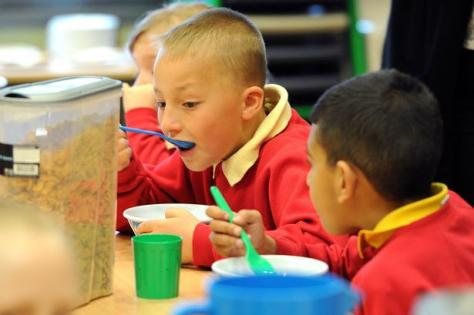More than one-third of households with children are finding it difficult to cover daily expenses such as food and other household bills according to Newspoll.
The national study, which was commissioned by Sanitarium, shows that 56% of households with children are buying lower quality food to save money and 27% are delaying paying bills so they can afford to put food on the table.
Not surprisingly, the situation is even more difficult for Australians who don't work with 46% having a tough time compared with 37% who have part-time work and 28% with full-time work. Single parent households and Australians living outside capital cities are also finding it more difficult to make ends meet.
It’s enough of a reason for Sanitarium to extend their partnership with the Australian Red Cross Good Start Breakfast Club – a program that has seen more than 4.7 million serves of cereal and soy milk products and an investment of $2 million over the ten years of the partnership. The Red Cross Breakfast Club has been in place since 1991.
The idea behind the Club is to give children who might not otherwise have adequate nourishment to get the best start to the day possible by ensuring they have breakfast. One in four children currently skip breakfast and this is higher in lower socio-economic areas.
“It’s hard to learn on an empty tummy!” says Rukshana Verzijl, Principal of Clayton North Primary School in Melbourne.
“The breakfast club at our school makes it easier for our students to concentrate on what the teacher is saying and to remain focussed on their studies.
“Along with increased attendance rates, there has been a marked improvement in the literacy achievement of many of our students who now have more energy in the morning. Starting the day on such a positive note has ensured greater school engagement,” Ms Verzijl said.
According to Sanitarium’s chief dietitian, Michelle Reid, there is ample evidence that a healthy breakfast helps children to learn and positively influences their mood.
“Children consuming a regular nutritious breakfast tend to have a lower intake of fat and higher intakes of protein, fibre, carbohydrate, vitamins and minerals, generally meaning a healthier diet overall,” said Ms Reid.
“Children who eat breakfast daily tend to choose more nutritious foods over the day, like fruit and vegetables, and less unhealthy snack foods such as chips, lollies and sugary soft drinks,” she said.
There are more than 200 Good Start Breakfast Clubs around Australia with 1,200 volunteers serving around 750,000 breakfasts to 5,000 children each year. To volunteer to help, or to make a donation, please visit Red Cross Breakfast Clubs.
Benefits of eating a healthy breakfast
1. Improve concentration, mood & academic performance
A range of scientific evidence indicates that regular consumption of breakfast by children enhances their ability to learn. A healthy breakfast provides fuel to brains and bodies, which has a positive impact on general mood and helps improve academic performance, particularly for those whose nutritional status is compromised.
2. Ensure adequate nutrient intake
Daily breakfast consumption provides growing bodies with valuable nutrients and is associated with lower intakes of fat and higher intakes of carbohydrate, dietary fibre and micronutrients.
3. Establish positive nutrition choices
Children who eat breakfast daily tend to choose more nutritious foods over the day, like fruit and vegetables, and less unhealthy snack foods such as chips, lollies and sugary soft drinks.
4. Foster good health & healthy weight
Older children consuming a regular nutritious breakfast tend to have a lower intake of fat and display higher cardiorespiratory fitness and healthier cardiovascular profiles. They also have higher intakes of protein, fibre, carbohydrate, vitamins and minerals, generally meaning a healthier diet overall. Conversely, skipping breakfast over childhood and adult years can mean poorer metabolic health in the long term, resulting in higher cholesterol and insulin levels as well as more fat around the waist, all of which can lead to chronic diseases such as diabetes and heart disease.
5. Healthy habits for life
Sharing the occasion of breakfast has intrinsic benefits which begin at childhood and continue all the way through an individual’s lifetime. Children learn by modelling behaviours. A recent Australian study found that young adolescents who perceived their mothers and/or best friends skipped meals meant they were more likely to also – including breakfast. Taking time to enjoy breakfast together can result in big gains for individual and community health.


















__small.png)










